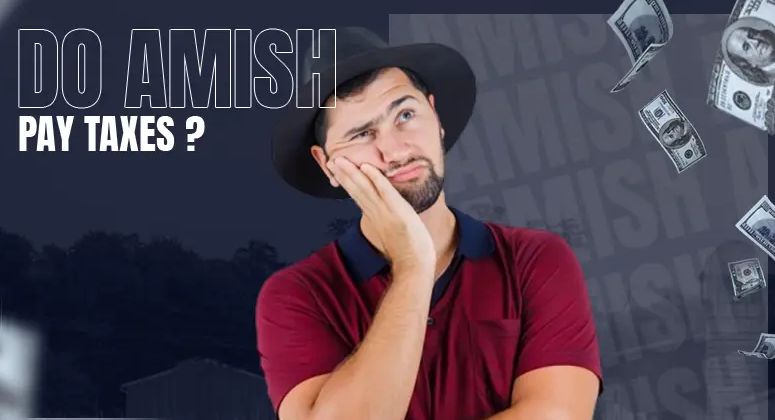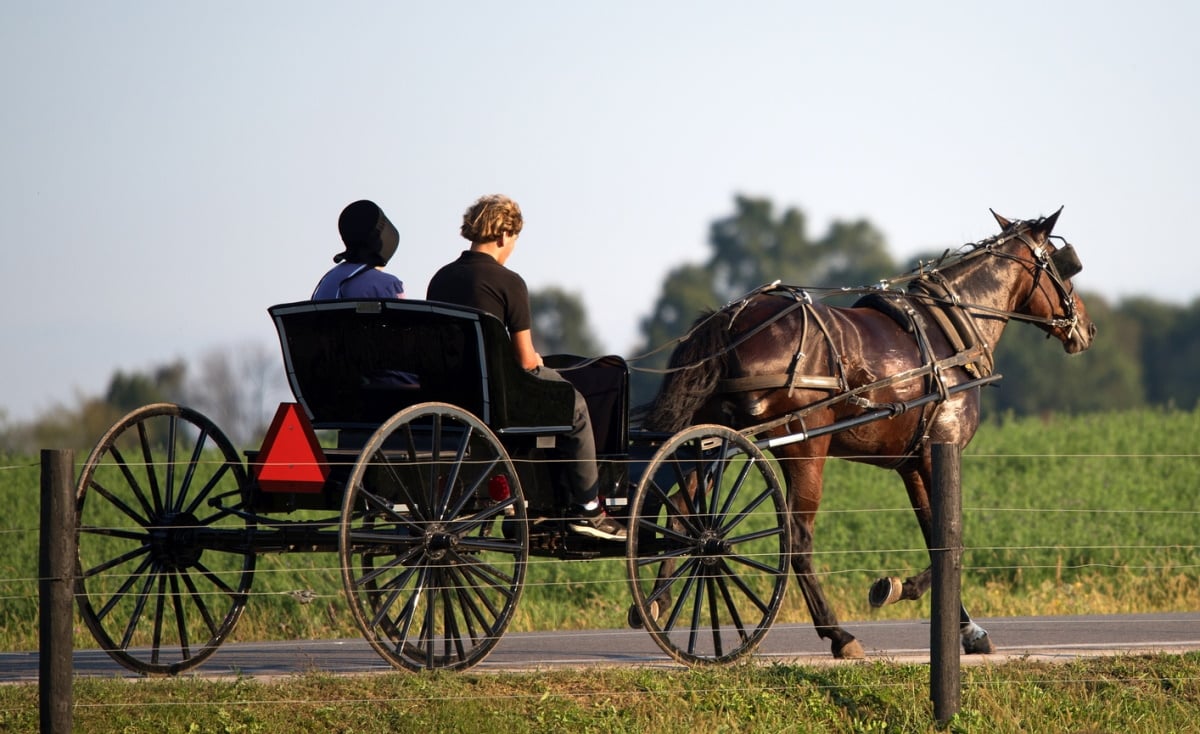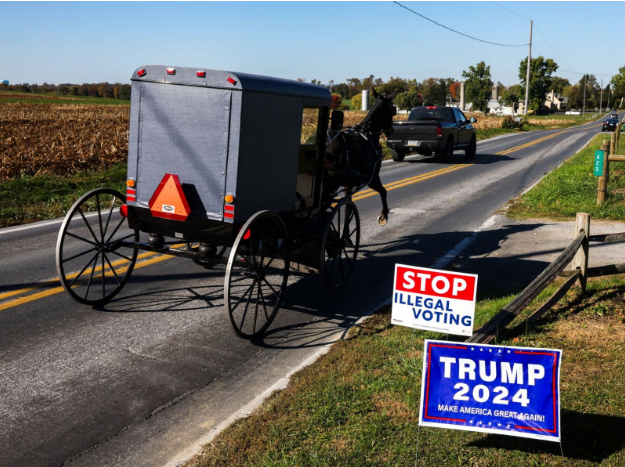The Amish are often seen as a group living apart from modern society, which leads many to wonder about their obligations when it comes to taxes. Do they follow the same rules as everyone else? Or are they exempt from paying taxes altogether?
The truth is more nuanced than a simple yes or no. While the Amish community lives a simple, traditional life — often without electricity or cars — they are still part of the broader legal and economic system in the United States. This article will walk you through the types of taxes the Amish are responsible for, where they might receive exemptions, and how things vary by state.
We’ll also address related questions like:
-
Do the Amish pay income or property taxes?
-
What about federal taxes?
-
Do Amish people vote or participate in public services?
By the end, you’ll have a clear understanding of Amish taxation without the confusion or myths that often surround the topic.
Do the Amish Pay Taxes in the US?
Despite living in close-knit rural communities and maintaining traditional lifestyles, the Amish are not exempt from most taxes in the United States. Like any other American citizen, they are legally obligated to pay several forms of taxes—though there are a few specific exceptions.

✅ Yes, the Amish Pay Most Taxes
Amish individuals and families do pay:
-
Income taxes (in most cases)
-
Property taxes
-
Sales taxes
-
State and local taxes
-
Road and fuel taxes
Whether they run a business, farm, or work for an employer, the money they earn is often subject to the same rules as anyone else.
What They Might Not Pay
There are some exemptions, mostly connected to their religious beliefs and community values. For example:
-
Social Security taxes: Amish who are self-employed can apply for exemption based on religious grounds. This stems from their tradition of community-based support rather than government welfare programs.
-
Medicare taxes: Similar to Social Security, they may also opt out of paying Medicare contributions if certain religious criteria are met.
Amish Taxation and the Law
The Amish have received religious exemptions under specific federal laws, including sections of the Internal Revenue Code. However, these are very narrow exemptions and only apply under strict conditions. They do not amount to a blanket tax exemption.
What Types of Taxes Do the Amish Pay?
While the Amish lead modest, self-sustaining lifestyles, they still operate within the United States’ tax system. From farming to small businesses, their income and land are often taxed just like everyone else’s. Let’s take a closer look at the types of taxes they are responsible for—and the few they may be exempt from.

1. Income Taxes
The majority of Amish do pay federal and state income taxes. If they are employed by someone else, taxes are withheld from their paycheck just like any other worker. Even if they’re self-employed—running a farm, bakery, furniture business, or repair shop—they are required to file and pay income taxes unless they qualify for specific religious exemptions.
-
Those exemptions usually apply only to Social Security and Medicare contributions, not income taxes in general.
-
Amish youth who are still learning a trade may be considered dependents, but working adults pay income taxes like most Americans.
2. Property Taxes
Amish families often own large farms or homesteads. Regardless of religious background, owning property means paying property taxes to the local or state government. These taxes fund schools, roads, emergency services, and more—even though the Amish may not directly use some of these public services (like public schools).
Still, they pay them without dispute. In many communities, Amish farmers are among the biggest contributors to local property tax revenue due to the size of their land.
3. Sales Taxes
When Amish individuals purchase goods—whether it’s lumber, tools, seeds, or clothing—they pay sales tax like anyone else. This applies in most states where sales tax is enforced. Since Amish communities often avoid cars and electronics, they may spend less in taxed categories, but they are not exempt from sales tax.
4. Road & Fuel Taxes
Amish may not drive cars, but they still contribute to road maintenance in other ways. For example:
-
If they own or rent land, part of their property tax helps fund roadwork.
-
When they purchase fuel for generators, farming equipment, or hired transportation, they indirectly pay fuel taxes.
5. Social Security & Medicare Taxes
This is where Amish communities often differ. If an Amish person is self-employed and part of an approved religious group that rejects public insurance (like Social Security and Medicare), they can file for an exemption. That means they won’t contribute to or receive those benefits.
-
However, this exemption is not automatic. It requires IRS approval and applies only to those who truly live without public assistance.
So while some believe that the Amish don’t contribute to the tax system, the reality is that they pay most taxes, just like anyone else—often without complaint. The only exceptions typically involve programs they don’t use due to their religious beliefs.
Where Do the Amish Pay Taxes? (State-by-State Breakdown)

The Amish live in over 30 U.S. states, with the largest populations found in Pennsylvania, Ohio, and Indiana. Despite variations in local laws, the Amish are subject to most taxes in each of these states—just like any other citizen.
Below is a detailed breakdown of Amish taxation based on state, with clarifications about income tax, property tax, and other specific notes.
Amish Tax Responsibilities by State
| State | Do Amish Pay Taxes? | Type of Taxes Paid | Additional Notes |
|---|---|---|---|
| Pennsylvania | ✅ Yes | Income, Property, Sales, School taxes | Largest Amish population. They pay school taxes even if they don’t use public schools. |
| Ohio | ✅ Yes | Income, Property, Sales | Many Amish run small businesses subject to regular tax laws. |
| Indiana | ✅ Yes | Income, Property, Sales | State laws don’t exempt Amish from paying taxes. |
| Michigan | ✅ Yes | Income, Property, Sales | Property and business taxes are regularly paid. |
| New York | ✅ Yes | Income, Property, Sales | Amish farmers pay substantial property taxes. |
| Wisconsin | ✅ Yes | Income, Property, Sales, Road Taxes | Amish contribute via farm and land taxes. |
| Missouri | ✅ Yes | Income, Property, Sales | Subject to all standard state taxes. |
| Kentucky | ✅ Yes | Income, Property, Sales | Some queries ask about “without a” — likely referencing non-driver status, not tax-related. |
| Maryland | ✅ Yes | Income, Property, Sales | Standard tax rules apply. |
| Tennessee | ✅ Yes | Income, Property, Sales | Amish communities are small but still taxed. |
| Iowa | ✅ Yes | Income, Property, Sales | No exemptions for religious groups under state tax law. |
| Maine | ✅ Yes | Income, Property, Sales | Few Amish communities, but taxes are still required. |
| Illinois | ✅ Yes | Income, Property, Sales | Amish businesses pay normal commercial taxes. |
| Minnesota | ✅ Yes | Income, Property, Sales | Amish here also file income taxes if self-employed. |
| Canada | Varies | May differ by province | Outside the U.S., so laws depend on Canadian tax code. |
Explanation
-
In all U.S. states, Amish individuals pay property taxes if they own land.
-
Income taxes are paid unless exempt for religious reasons, which requires legal documentation.
-
Sales tax applies in most states when they purchase goods or materials.
-
Amish do not receive blanket exemptions from any state.
Where Do the Amish Pay Taxes? (State-by-State Breakdown)
It’s a common misconception that Amish communities operate outside of the modern tax system. While the Amish may live in tight-knit, self-sufficient groups and follow religious rules that limit their use of technology, their economic activities still fall under federal, state, and local tax laws.
Do Amish Communities Pay Taxes?
Yes, Amish communities collectively contribute to taxes, primarily through property ownership and local fees. Although they may not use all public services (like public schools or emergency services), their land and homes are taxed like any others.
-
Community-held property is taxed based on local property assessment rates.
-
Some Amish settlements may include multiple families pooling resources to maintain large farms, but ownership still triggers tax obligations.
Do Amish Businesses Pay Taxes?
Absolutely. Amish-run businesses—whether it’s a furniture shop, dairy farm, metal workshop, or produce stand—are subject to the same tax rules as any other small business in the U.S.
Here’s what that includes:
| Tax Type | Applies to Amish Businesses? | Explanation |
|---|---|---|
| Income Tax | ✅ Yes | Profits made through sales or services are reported and taxed accordingly. |
| Sales Tax | ✅ Yes | When selling products to non-Amish customers, sales tax is usually collected. |
| Self-Employment Tax | Sometimes | If exempt from Social Security, they may skip this, but otherwise it applies. |
| Payroll Tax | ✅ Yes | If hiring non-Amish workers, standard payroll rules apply. |
Many Amish businesses keep handwritten ledgers and file paper forms, but they still submit tax filings. In fact, some businesses generate substantial income and are registered with state departments like any other entity.
Whether working as individuals or collectively within a business, the Amish are not exempt from the responsibilities that come with financial transactions. In many rural counties, Amish farmers and tradespeople are vital contributors to the local economy—and its tax base.
Do the Amish Vote and Participate in Civic Duties?
The Amish are deeply religious and value separation from the outside world. This often includes limited participation in government and public affairs. However, their approach to voting and civic responsibility isn’t as clear-cut as some might think.

Do the Amish Vote?
In most cases, the Amish rarely vote, but they are not legally prohibited from doing so. Their low participation rate is largely a cultural and religious choice—not a legal exemption.
-
Amish teachings often emphasize non-involvement in politics to preserve humility and avoid conflict.
-
That said, some Amish do vote in local elections, especially when issues affect land use, education, or community values.
For example:
-
In Pennsylvania and Ohio, some Amish voters participate in school board elections or zoning referendums.
-
Voting rates are higher in communities that feel their way of life may be directly impacted.
Do the Amish Pay Taxes Even If They Don’t Vote?
Yes—not voting does not excuse anyone from paying taxes, and the Amish understand that. They may avoid political involvement, but they still comply with tax laws, including property, sales, and income taxes.
This distinction often confuses people: just because the Amish choose not to vote doesn’t mean they are exempt from contributing financially to the system
Why the Disconnect?
Many people assume voting and paying taxes go hand in hand. However, participation in democracy is a right, not a requirement. The Amish pay taxes as part of their legal obligations, but choose to abstain from voting to preserve spiritual and communal values.
Why Do Some People Think the Amish Don’t Pay Taxes?
There’s a long-standing myth that the Amish don’t pay taxes—but where did this idea come from?
It turns out, a mix of religious exemptions, low public visibility, and unique lifestyle choices have led to confusion. In this section, we’ll debunk the most common misconceptions.
Misconception #1: “They Don’t Use Government Services, So They Must Be Exempt”
One reason people assume the Amish don’t pay taxes is because they often don’t use public schools, health insurance, Social Security, or public assistance. They rely on internal community support instead.
But here’s the truth:
Even if the Amish don’t use certain services, they still fund them through taxes—just like someone who sends their kids to private school still pays school tax.
Misconception #2: “Religious Exemption = No Taxes”
Some Amish do apply for exemptions from Social Security and Medicare taxes, but that exemption:
-
Only applies to specific programs
-
Must be legally filed through IRS Form 4029
-
Requires the person to live a lifestyle that avoids any form of public insurance or benefits
It does not mean they are exempt from:
-
Income tax
-
Property tax
-
Sales tax
-
Local fees and business taxes
Misconception #3: “Because They Don’t Vote or Serve in the Military, They Must Be Outside the System”
While it’s true that the Amish generally don’t vote or serve in armed forces due to pacifist beliefs, these choices are personal and religious, not legal exceptions from taxation.
Paying taxes and civic participation are separate responsibilities in the eyes of the law.
Myths vs. Facts
| Myth | Reality |
|---|---|
| The Amish don’t pay any taxes | They pay most taxes—property, income, sales, and more |
| They are fully exempt due to religion | Only from Social Security and Medicare if approved |
| They don’t use public services, so don’t pay | They still fund services they don’t use through local/state taxes |
| Not voting = not taxed | Voting is optional; paying taxes is mandatory |
Frequently Asked Questions (FAQs)
Here are clear, straightforward answers to the most common questions people search for about Amish taxes.
Do Amish pay federal income tax?
Yes, most Amish individuals pay federal income taxes. If they’re employed by someone else, taxes are automatically withheld. If self-employed, they file tax returns like others—unless they’ve received an approved religious exemption from Social Security and Medicare taxes, which does not cover income tax.
Do Amish pay property taxes in Pennsylvania and other states?
Yes. Regardless of where they live—Pennsylvania, Ohio, Indiana, or anywhere else—Amish property owners pay local property taxes. This includes taxes that fund public services, even if they don’t use those services.
Do Amish pay school taxes even if they don’t send children to public schools?
Yes. In places like Pennsylvania, Amish families pay school taxes as part of property taxes. While they send their children to private or community-run schools, the law still requires them to contribute to public education funding.
Do Amish pay sales tax?
Yes, when purchasing items at stores, Amish individuals pay sales tax like everyone else. This applies to tools, farming supplies, groceries, and other everyday goods, depending on state laws.
How do Amish pay taxes if they don’t use computers or banks?
Many Amish still file paper tax returns or work with trusted non-Amish advisors (often accountants) to ensure compliance. Some use money orders or in-person banking to manage payments.
Do Amish businesses get taxed like regular businesses?
Yes. Amish-owned businesses follow state and federal tax regulations, including income tax, sales tax, and payroll tax (if they employ non-Amish workers). The only exception might be self-employment tax if they are exempt from Social Security participation.
Do Amish in Canada pay taxes?
In Canada, the Amish follow the same rules as Canadian citizens. That includes income and property taxes. However, any religious exemptions depend on provincial law and are not as clearly defined as in the U.S.
Why do some people think the Amish don’t pay any taxes?
This belief comes from confusion around religious exemptions from specific programs like Social Security. In reality, the Amish pay most standard taxes, including property, income, and sales taxes.
Do Amish pay land taxes even if their homes are built by hand?
Yes. All landowners, including the Amish, are subject to property (land) taxes based on local assessments, regardless of how the home was built.
Conclusion: The Amish and Taxes—A Clearer Picture
The Amish may live simply, but their financial responsibilities are far from disconnected from modern society. While certain religious exemptions allow them to opt out of programs like Social Security, they still pay most taxes—including property, income, sales, and business taxes—just like everyone else.
Whether farming in Pennsylvania, woodworking in Ohio, or selling produce in Indiana, Amish families and businesses are part of the broader economy. The idea that they’re “tax-exempt” is a myth—rooted more in misunderstanding than fact.
So next time you hear someone say the Amish don’t pay taxes, you’ll know the real answer: they do—and often without hesitation.
.

